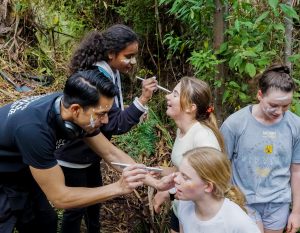Aboriginal and Torres Strait Islander peoples are advised that this article contains images and references of a deceased person.
Geelong Grammar School is located on the ancestral lands of the Wadawurrung, Wurundjeri and Taungurung people of the Kulin nation.
We respectfully acknowledge the traditional owners and custodians of these lands and pay our respects to Elders past, present and emerging. We recognise and respect their cultural heritage, beliefs and continuing connection with this land. We recognise the responsibility we have in caring for this country, which has deep spiritual significance for Aboriginal and Torres Strait Islander peoples, whose cultures are amongst the oldest living cultures in human history. We recognise the importance of educating our students in the strong foundations of culture and identity. We acknowledge that better understanding and respect for Aboriginal and Torres Strait Islander cultures develops an enriched appreciation of Australia’s cultural heritage and can lead to reconciliation.
Our Commitment
Geelong Grammar School’s Indigenous Programme has been in place for almost 20 years and since then, approximately 80 students have attended the School. More recently, the School has approximately 25 Indigenous students enrolled across Years 7 to 12, with the majority of these students supported by a Yalari Scholarship.
As a School and outlined in the Geelong Grammar Reconciliation Action Plan, we are committed to:
- strengthening relationships with our Aboriginal and Torres Strait Islander students and their families
- continuing to build relationships in local communities
- working toward developing a culturally responsive school
- developing a Whole School understanding of the social and cultural issues from the past which have an impact on our present
- ensuring that Aboriginal and Torres Strait Islander perspectives are included across all year levels in all curriculum areas

Programmes and Practices
Our School seeks to develop staff, student and community understanding of Aboriginal and Torres Strait Islander histories, cultures and languages, while establishing culturally safe practices throughout the School. Through learning and teaching experiences and open and rigorous conversations, we aspire towards a collective responsibility to make a positive difference.
Some of the ways in which we are working towards our vision of creating a culturally responsive school include:
- At each of our four campuses, we have Indigenous Coordinators to lead the Indigenous programs and support our students. At Corio Campus, we have a full-time Indigenous Coordinator who is readily available for our indigenous students and their families. Each campus works with an Indigenous Consultant to include an Aboriginal and Torres Strait Islander perspective across the curriculum.
- A CARE team (Creating Awareness of Reconciliation Through Education) consisting of over 20 students – indigenous and non-indigenous and 5 staff members has been established with the purpose of focusing on cultivating student voice and student agency in promoting cultural awareness and reconciliation in the School.
- At significant school events, assemblies and commencement of the year, we hold a smoking ceremony combined with a Welcome to Country. At Timbertop, a ceremony is conducted by a Taungurung Elder to welcome and cleanse students before they start camping and hiking on Taungurung land.
- We participate in events to celebrate or commemorate days/weeks of national significance for Aboriginal and Torres Strait Islander peoples to show our pride in, and respect for, Aboriginal and Torres Strait Islander histories and cultures. This includes NAIDOC (National Aborigines and Islanders Day Observance Committee) week and Reconciliation week where we engage students across a diverse range of experiences from workshops, celebrations, presentations and guest speakers, including current and past indigenous students.
- Embedding Aboriginal and Torres Strait Islander histories, cultures and perspectives in curriculum is a key and ongoing consideration across all year levels from early learning to Year 12, and all learning areas from PYP (Primary Years Programme) Units of Inquiry to The Arts, Humanities, Sciences, Outdoor Education and Wellbeing programmes.
- Our School actively works towards embedding Aboriginal and Torres Strait Islander languages into everyday experiences including the singing in Wadawurrung language by the school choir and early learning students, using bush foods and a medicine garden to embed Wurunjeri language into science, language and cooking experiences, and the use of a Taungarong Country map created by a Timbertop staff member, which is distributed in student diaries and displayed in Units, embedding a deeper knowledge and understanding of the High Country using the traditional Taungurung language.

